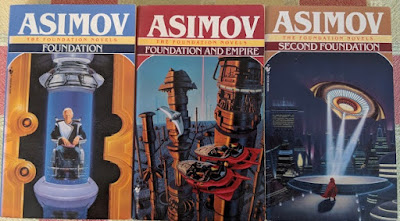Simplified Series - Foundation
 |
| That old man hologram is a much more important character than you'd initially expect. |
My feverish pursuit of MOAR content brought forth this feature: Simplified Series. Here's the pitch: quick synopses (I'll try and keep them spoiler-free, but you know, most of these are past the statute of limitations on spoilers) of the entries in a series followed by the reasons you should or shouldn't read it. This week:
The Foundation trilogy by Isaac Asimov
Background info: Asimov was a prolific author of science fiction and non-fiction books on a variety of topics. You may know him from adaptions like I, Robot or Bicentennial Man. Anyway, today we'll be talking about the Foundation trilogy. That's right, I said trilogy, this will only cover Foundation, Foundation and Empire, and Second Foundation, not any of the prequels and sequels he wrote in the 80's and 90's. I've read most of those as well, but this post would just be too long. Plus they start intersecting with his other series, so the whole thing gets too convoluted. With that out of the way, the Foundation novels were built out of a series of short stories that Asimov published in the 40s detailing a distant future where Psychohistorians use psychology and statistics to mathematically model the future.
Foundation (1951) - No one in the Galactic Empire wants to take Psychohistorian Hari Seldon's prediction of a 30,000 year galaxy-wide dark age seriously. So he does what any reasonable scientist would do: he accepts exile so that he can work on compiling an encyclopedia! 50 years later he's dead, but his encyclopedia project is going great, except his prediction that the Empire would break apart is coming true. Don't worry, his posthumous hologram explains that the encyclopedia was just busy work, he really accepted exile so that he could lay the, what's the word, oh right, groundwork, for a political entity that could start a new empire and restore civilization and peace to the galaxy. Will the Foundation's plan to create a religion based on science and send out missionaries pay out long term dividends? Wait a minute, there was a character named "Wienis" in this novel? Did Hari Seldon leave behind as many prerecorded messages as Cave Johnson?
Foundation and Empire (1952) - So, eventually, the Foundation becomes large and influential enough to attract the attention of the remnants of the Galactic Empire. Specifically, one of their generals views them as a threat. But you know, we all know that if Hari Seldon predicted the Empire's fall, then it's gonna fall, so let's skip to the second part, which is the part that's actually, you know, memorable. A thousand years later and the Empire is gone (big surprise, I know) and the Foundation is the new galactic superpower. That is until a psychic (well, empathic) conqueror known as the Mule starts knocking on their borders. Don't worry, say the leaders of the Foundation, Holo-Hari will show up and tell us what to do. And he does, except it turns out that he predicted a different war breaking out, so it looks like the Foundation is on its own this time out. Will their knowledge of advanced science be enough to protect the Foundation from a dangerous mutant or will they have to find the fabled Second Foundation? Are there answers on the old Imperial capital of Trantor? What about the Mule's escaped jester, Magnifico Giganticus? What would Ebert's Law of Economy of Characters have to say about him, hmm?
Second Foundation (1953) - (Side note: who names the third book in their Foundation trilogy Second Foundation?) The Mule is trying to track down the Second Foundation with little luck. But is that because his empire's been infiltrated by Second Foundation agents who have mental powers not unlike his own? Maybe. What about the original Foundation? What are they up to? Oh, they're also looking for the Second Foundation? So, was Hari Seldon's plan to have the two Foundations duke it out with the stronger forming the, what's the right word, oh, bedrock for a second empire? Or is it more like they're two sides of the same coin? Two great tastes that taste great together? Was this whole trilogy just an elaborate puzzle box for the reader to figure out?
Why should you read the Foundation trilogy? They're sort of a quintessential classic sci-fi trilogy. Asimov's science fiction writing is always dripping with ideas, and Foundation is no exception. Asimov explores history, psychology, the division between hard and soft sciences, the implications of psychic powers, etc. In a way that's fun and (like his robot stories) functions as a sort of literary puzzle box.
Why shouldn't you read the Foundation trilogy? So, you know how when something is really, really, like, really influential everyone kind of copies its best ideas and expands on its themes? And you how when you finally go back to the source and read the original it can't help but feel a little derivative, even though that doesn't make sense because it inspired those other things you've already read? Yeah, I think the Foundation books run that risk. Even though I found them quite enjoyable, I could see how someone whose already read a lot of similar stories might not be as impressed by them. Also, while Asimov is pretty good with ideas, he's not as great with writing characters or dialogue. So there's that.
Links:
Apparently Apple has acquired the rights to develop a TV series based on the Foundation trilogy. Huh, weird choice, Apple.
Comments
Post a Comment